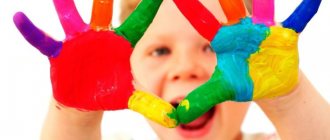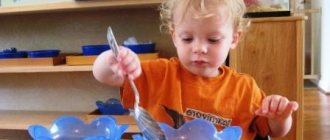Personal development is part of overall human development, along with physical and mental development. The question of how a child’s personal development occurs is of concern to, perhaps, all parents. The transition from a baby, who cannot yet be a person, to an adult who has a formed personality, does not happen all at once - it is a gradual process - a path on which the child takes step by step, moving towards becoming a person.
The main stages of child personality development
Any child psychologist will tell you that a child is a person. To understand how a child’s personal development occurs, it is necessary to find out what is meant by this concept. In psychology and sociology there are different definitions of personality; most often this term refers to the human individual as a subject of relationships and conscious activity. At the same time, the process of becoming an individual as a personality does not happen suddenly, but gradually, and under the influence of many factors.
Child psychologists identify the following stages of development and formation of a child’s personality, in accordance with his age:
- early childhood, from birth to 3 years;
- preschool and school childhood, from 4 to 11 years;
- adolescence – 12-15 years;
- youth – 16-18 years old.
A newborn baby, already from the first day coming into contact with the outside world: mother, doctors and nurses, begins to understand the surrounding reality, which means his personality begins to develop. It is the first three years, when a child is raised in a family and his world is limited to this social group, that are the most important for the further development of his personality. If cooperation, goodwill and mutual understanding reign in the family, the child becomes a caring, gentle person, he knows how to admit his mistakes and be responsible for them.
In each age period, the baby goes through 3 phases of personality development:
- Adaptation - he masters the simplest skills, masters the language.
- Individualization - this involves contrasting oneself with others, highlighting one’s own “I”.
- Integration - the child learns to manage his behavior, obey adults and interact with others.
Moreover, if by the next age period the child has not completed the integration phase of the previous one, the prerequisites for a crisis in personality development are formed (crisis of 3 years, 7 years, etc.). This feature of the child’s personality development must be taken into account when searching for ways to overcome age-related crises.
What is a personality?
Personality is a unique and unrepeatable inner world of a person, which can be characterized by a set of certain qualities, preferences, ideas, views, aspirations, etc.
It reflects the essence of a person and helps him in social interaction, as it is what distinguishes him from others. In early childhood, the process of individuality formation just begins, which reaches its apogee in adolescence and ends at the end of adolescence.
Let's consider the factors that influence the formation of the personality of a small child.
The influence of the team on the personal development of the child
In preschool age, the child encounters another social group that is significant from the point of view of personal development - the team, most often this happens in kindergarten. The development and formation of a child’s personality is influenced by relationships with peers and educators; here he learns discipline, communication, and acquires work skills.
Being in the individualization phase for a given age period, the child will try to stand out in the team. This will happen either through positive self-presentation in various activities, or through mischief and disobedience. At the same time, the teacher’s assessment will be as important for him as the parents’ assessment. All these same 3 phases of the child’s personality development also occur at primary school age, when he enters a new social group - school. Now the teacher’s assessment will be significant for him.
Formation of the baby's personality
Let us understand in detail what a child’s personality is. Often adults misinterpret the manifestation of their child’s personality. Violent moodiness or too quiet behavior is not a personality. It is rather the baby’s reaction to certain phenomena in his life.
The formation of a child’s personality, according to scientists, begins in the womb. This controversial opinion has many objections. Newborn children react completely differently to external stimuli, and this fact proves that he has the rudiments of personality.
The interpretation of the concept of personality implies:
- manifestation of will;
- reasonable understanding of the environment;
- freedom of decision;
- expression of feelings.
The equal interaction of these qualities makes a person an individual. To deny a child the right to make certain decisions means to limit the development of will. The adult’s task remains to explain to the child the consequences of his actions.
Pay attention to how your child explores his surroundings. In the early stages, this manifests itself in the form of broken toys, torn books, torn wallpaper, and drawings on any surface. All these are attempts to analyze the world around us. And this is proof of another manifestation of personality. Any situation requires an adequate reaction from parents; it lays the foundation of standards for the child. He will rely on them in adulthood.
Adolescence and personality development
During adolescence, the conditions for the development of a child’s personality change, he does not move to a new group, the group itself changes. At this age, communication in the company of peers becomes increasingly important for him. Now their opinion and assessment become equal or even more authoritative than the opinion of parents and teachers. In adolescence, there is another feature of the development of a child’s personality - too rapid changes in the socio-psychological structure of the group in which he is located lead to an identity crisis, which is characterized by a spirit of contradiction and the desire to gain one’s own experience.
As a rule, by the age of 18, the process of formation and development of a child’s personality is completed; it is no longer possible to radically change it, you can only guide the young person and correct his behavior. Therefore, it is necessary to instill in a child moral and ethical values and teach him norms of behavior from an early age. It should be understood that a child’s character is a consequence of the life experiences he has. It depends on the conditions of development of the child’s personality. In the initial stages of development, a child's beliefs and norms of behavior are formed based on what he sees in the family. As a child grows up, more and more factors appear that influence the social development of the individual, he is surrounded by more good and bad role models, he sees different situations, which form his opinion about everything he encounters in life. At this stage, only the positive example of the parents may not be enough; you need to talk with the child as much as possible, explaining to him in an accessible form the basic human values. The main task of parents at the stage of growing up of a little person is to maintain his trust, then they will definitely be able to raise him to be good and kind.
Rate this article: 4.1 4.1 out of 5 (10 votes)
Patterns of personality development
The development of personality, its formation is an interconnected and holistic process, which is characterized by stages of personality development. Let's think about the question: what are the patterns of personality development? Why does personality develop and how does it happen?
So, the main patterns of personality development:
- Age factor - the younger a person is, the faster his physical development occurs. Over time, the process slows down. There are similar observations about spiritual development; the younger a person is, the faster his spiritual growth occurs.
- Therefore, we often hear that young and old, children understand old people very well, they can quickly understand the story, show interest, absorb knowledge and feel the state of mind of the narrator.
- Uneven development is observed in the presence of certain periods of growth, which we observe in the development of our children. The body does not develop constantly, it seems to us that the child suddenly begins to grow at a certain stage, these are the physiological characteristics of the body. The same can be said about spiritual development - there is unevenness
At different times, a person’s properties can change and be at different levels of development. In life there are more favorable conditions for personal development and less favorable ones. However, these conditions will be temporary. What influences a person?
Of course, communication with the outside world and people, spiritual development occurs in the knowledge of the world and oneself. There are also leaps in the development and awareness of processes due to stressful situations that make fundamental changes in a person’s personality. “Every cloud has a silver lining,” people say. Even in times when the world seems to be collapsing, think about what you will build from scratch.
3. Fluctuations in development - the organs of the human body develop each at their own pace. This is reflected in mental and nervous processes. Basically, differences between people and the level of development are manifested in behavioral aspects, thinking, intellectual level, social and moral development.
Features of self-awareness
Self-awareness is a child’s understanding of himself, his qualities, and relationships with the surrounding reality. The most striking form of self-awareness is considered to be self-esteem, the way a child evaluates his achievements, personal qualities and capabilities. Initially, the baby does not have the opportunity to evaluate himself, so he uses the position of others. So, if the mother constantly tells the child that he is doing well, this is the position that will be imprinted on him.
In addition, the preschooler’s self-awareness should include:
- understanding of one’s gender (the child recognizes himself as a boy or a girl) and appropriate behavior;
- understanding one’s place in the world, one’s own social position, this most often happens by the beginning of primary school age. A child entering first grade already clearly understands that he is a school student.
The child develops new values and experiences, his inner life becomes more complicated, his actions and behavior change. It is very important to help him in this difficult process, since only in this way can the baby become an equal member of society.
Society and personality development in the child.
There are several theories that say that a person's personality is directly related to genes. However, why do siblings develop into completely different personalities? Nobody has yet found the answer to this question. Then there is another theory that says that the environment in which a child develops makes up his personality. The child's parents, teachers, friends, acquaintances, his home environment, his school environment - all this has a great influence on the formation of his personality. Finally, the events that a person experiences and at what age, teenager or adult, play a major role in determining his reactions, his feelings, his emotional makeup and modes of behavior.
The influence of the surrounding world on the formation of the personality of a small child
The second most important influence on the formation of a small child’s personality is the world around him.
But it should be borne in mind that the process of personality formation can only be influenced by that part of the surrounding world with which the baby comes into contact. That is, this is his environment.
This could be a sandbox and children with their parents who surround him on the playground, a kindergarten with his teachers and nannies, a salesperson in a store where the baby often goes with his mother.
At an early age, parents should provide their daughter or son with a sense of safety and security.
The fact is that it is in early childhood that not only personal qualities begin to form, but also phobias and psychological personality disorders.
Therefore, it is very important that the emotions and feelings associated with the world around us are positive.
For example, a small preschooler who experienced aggression from other children in early childhood may himself be aggressive towards his peers as an adult - this is a subconscious defensive reaction.








